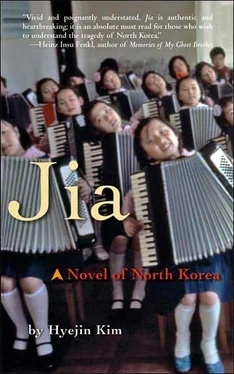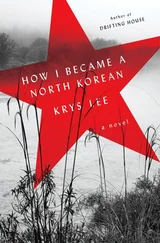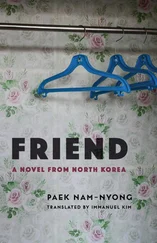The oldest man turned his head to me and asked abruptly, “Do you remember anything about your family or where you lived before you were seven?”
“No,” I said, shaking my head, folding my hands on my knees.
“Stand up when you answer our questions,” the sharp-eyed woman ordered, and I sprang to my feet. Surely, she was the scariest person I had ever met. “When did you learn to dance?”
I stood at attention. “Three years after I came here.”
“She was really good,” the director said. “She had never been schooled in dance or singing. One day when she passed a classroom, she saw a group of students practicing dancing. She just copied the older students’ dancing in front of the door, but she was like a tiny flying butterfly.” The director lavished praise on me, gazing at me with a warm smile. It was true: if she hadn’t seen me in the hall that day, I never would have started dancing professionally.
They didn’t respond, or even look at the director.
“So… she might be from the reactionary class,” the oldest man muttered to himself, without taking his eyes from my document.
The sharp-eyed woman nervously tapped the handbag on her knees. “What are you talking about? I told you I’ve already made a decision. I’m the one who trains students; I’ll decide whether we’ll take her or not.”
The man looked unsatisfied. “Whatever you want…. But bear this in mind: you may be wasting your time. I’ll report her to the department as a possible risk, and if she isn’t approved, you’ll have to handle it on your own.”
She stood up and said, “I’m not going to use her for the main part. I just need more extras and stand-ins. We don’t have time to be so picky.” The others stood up as well, and the sharp-eyed woman turned to me and said, “We’ll take you tomorrow. Pack your things. You’re not going to come back here for a while, or forever. So take everything that belongs to you.”
As soon as she finished, she left the room, holding her bag on her forearm. The oldest man accompanied her, shaking his head, his hands folded behind his back. The others snickered into their sleeves and followed. The director hurried behind them. Their departure finally left me with some space to breathe, and I felt all my muscles loosening. I tried to stand up, but sunk down wearily into a chair. They had demanded I do several things with no explanation; truly, they were typical representatives of their government.
“What’s going on here?” I muttered to myself.
We had made so many preparations for the annual visit of the government officials. Two months earlier we had begun to put the building in order. For the performance, I danced a fan dance, sang in an opera, and then played the accordion. The performers were divided into three groups: traditional dancers, revolutionary dancers, and musicians. Sixty orphans had been chosen for the performance.
For the finale, all the performers appeared on stage and played the “Song of General Kim Il Sung” (kimilsuug jaug-guu ui norae) on accordions, and then the whole audience sang together as the accordion players walked into the audience, praising the Great Leader’s achievements.
The rehearsals had required so much time and effort, but the performance itself was over in a matter of hours, and afterward the government officials shot out of the auditorium like arrows. They had applauded, given us flowers, and handed out a few wan compliments. Then their cars disappeared. The performance season was officially over. Returning to our rooms, we collapsed on our beds. The following day was quiet, and we had no classes or activities for the next few days.
On the day when the government officials came again to see me, I had gone in the morning to the dancing hall, but none of the other orphans were there. I knew that, after the performance, the others were sick of that place and wouldn’t go there for a while.
Alone, I practiced the part of Girl Selling Flowers that I especially liked. Bending my arm as though holding a flower basket, I stretched the other arm toward the sky. I sang the passage where the lead, Kkot-bun, begs passersby to buy flowers. Kkot-bun’s devotion to her family saddened me. At least she had a family near her.
When, with a heavy heart, I returned to my room from the dancing hall, I found a message saying the director wanted me in her office right after lunch. But I didn’t expect I would meet those strangers in her office.
As I rose to my feet, still shaking from the impromptu performance, the director returned to the office. She rushed straight to me and grasped my hands. “Oh! I’m so proud of you, Jia. You don’t know how happy I and right now.” Her reddish round face beamed with pleasure.
I was taken aback. “What’s going on here, Director? Who were those people? Why did they come here?”
She held my arms more tightly and brought her face close to mine. I couldn’t help but grunt from the pain, but she didn’t care. “They are all government officials in the art and propaganda department. Jia, they are really high-positioned people. In your life, you would never have the chance to talk to them. Now, they are totally crazy about preparing for the World Festival of Youth and Students, the big festival next year. People all over the world will come to see our Great Leader and the happy life we live under the Great Leader, and we will welcome them with our dancing performances. Isn’t that exciting!”
The director’s face glowed a deeper red.
“The government officials are looking for fourteen-to-eighteen-year-old girls in every school. Every year they select girls who have dancing and singing talent, and of course, who have a good figure. They saw your performance last weekend, and this morning I got the call. Everything went so well! I still can’t believe it. They’ll take care of you, they’ll train you as a professional dancer. Jia—it’s a once-in-a-lifetime opportunity. This is especially rare in the orphanage. You should be grateful to the government; you’re a chosen person now. You’ll participate in the official dancing group for the festival—they handle the best dancing group in the country. The Great Leader will see your dancing—I knew it. I knew they would take you. I knew it.”
She hugged me several times, until her big glasses nearly slipped off her small nose. My body staggered in the director’s arms. My heart trembled. Am I leaving? Am I really leaving?
At noon the next day, as I left the orphanage, the director cried and held my hands. I couldn’t help but break down in tears too; she was like a mother to me. Unable to have a baby of her own, she was the only one who opened her heart and regarded the orphans as her own children. The teachers treated us like trash. No one cared about us, because no one needed us.
I was already 16; the only reason I had been able to stay longer than other orphans, who usually departed before they were 14, was to teach the younger kids how to dance. Otherwise, I already would have been a garbage collector, or a factory cook.
As the car departed, I watched the gray buildings of the orphanage I thought I might never leave grow smaller. I had been stuck in those dismal buildings for ten years. I still remembered the day I arrived—it was as clear as yesterday in my mind.
Following our arrival in Pyongyang, the soldiers took me directly to the orphanage. When the army cars pulled up in front of the high building, Uncle Shin helped me out of the car, and I saw a middle-aged woman with a round face, round glasses, and a round belly bounce toward us. Several people followed her out while, with flushed cheeks, she talked to the bushy-eyebrow soldier. Eventually she nodded her head and approached me, reaching her moist hand out to mine. “Come here, baby,” she said. “We’ll take care of you.”
Читать дальше












